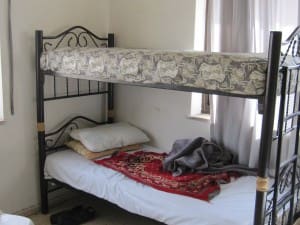I hate the untenable situation faced by the Jerusalem hospitals serving Palestinians. The problem isn’t theoretical. It’s real. It affects people.
A Friend of a Friend is Bleeding from Her Brain
A couple of weeks ago, a friend of a friend got an excruciating headache and started vomiting and seizing. The family rushed her to a clinic in their remote West Bank village, and the clinic put her in an ambulance and sent her to Rafidia Hospital, Nablus’ largest. Rafidia’s doctors decided to send her to St. Joseph’s Hospital in Jerusalem. But getting out of the West Bank and into Israeli-controlled Jerusalem requires “coordination” (the Palestinian Authority and Israeli officials must agree to allow this patient to reach the hospital) and it requires a referral (the Palestinian Authority must agree to pay for the care).
It took three days for the girl to get the paperwork she needed to go to Jerusalem. Three days! At least she got approval – not everyone does. And after all that, the coordination wasn’t done properly. Since West Bank ambulances aren’t allowed to enter Jerusalem, patients (or corpses) are transferred out of the back of one ambulance into the back of another. But no Israeli ambulance was waiting at Qalandia checkpoint, and the girl, with tubes draining fluid from her brain, had to wait.
At St. Joseph’s (locally known as the French Hospital), the girl was put in intensive care. The surgeon who cares for her is renown for his excellence, and the nurses are dedicated and caring. But that wasn’t enough to get her an MRI. It was ordered on a Thursday but the Palestinian Authority Ministry of Health was on strike – they didn’t even answer the phones! After the strike, they couldn’t find the referral request due to the backlog. When they finally approved the referral and the MRI was scheduled, six days had gone by. Six more days!
The Patient’s Mother Sits on a White Plastic Chair
Meanwhile, the Israelis have refused requests from the girl’s father or any other relative to enter Jerusalem to visit or provide support. Is that legal? I really don’t know. He’s in the village with their other children while the girl’s mother sits next to her daughter on a white plastic chair. The chair is uncomfortable, but not as uncomfortable as the whole situation: Why should a mother be forced to make big decisions alone, deal by herself with confusing medical information, not to mention trying to handle her fear, sitting by her daughter’s side alone day after day?
Given that the French Hospital treats severely ill patients from the West Bank and Gaza, and given that each patient is allowed one accompanier or perhaps two in some cases, you would think the hospital would make it more comfortable for those who are far from home with absolutely no local connections. These are people who left home with their sick loved one in an urgent situation – they didn’t think to bring a change of clothes or a toothbrush or a magazine to read.
Of course, some people are fortunate enough to pay for private rooms, but there is no place for family members of patients in intensive care. I feel terrible seeing patients’ family members sitting on those plastic chairs all day long, often sleeping there. Sometimes women lie down in the public waiting room where men also sleep. There is no shower, so they wash the best they can in the public bathroom. People may be sent clothes and blankets, but there’s no place to wash and dry them. There is no locker, so people’s belongings, crammed into multiple plastic bags, are stuffed into the corner of the public area where there is a high rate of theft. The hospital has a small kiosk they call a cafeteria, but when the lone worker goes home, there is no more coffee, no more sandwiches. There is no refrigerator to store families’ food or drink, and no microwave to heat up leftovers.
The Patients’ Families are Sick Too
Due to the nature of the patients’ conditions, family members may wait weeks or even months while their loved one gets care. They are stuck in Jerusalem, a place many of them can’t move without risking arrest by police (they don’t have permission to wander around), and there are no stores or restaurants in close walking distance of the hospital. Not to mention that most of these folks are poor, very poor. Having a loved one in treatment is one more major drain on their already strained finances. Imagine having to shell out an extra $10 or $20 dollars a day on food for the accompanier.

According to the General Administrator of the Hospital, Jamil Koussa, the Hospital tries to support families, though he wishes they could do more. They have a small room and bathroom where men can sleep (70% of the accompaniers are men), but other efforts he’s made have been met by sabotage – stolen blankets, broken beds, and more. “Someone even stole the faucet handles on the sink in the accompaniers’ room,” Jamil Koussa told me.
Why? Why would people whose loved ones are in the care of the Hospital, and who are receiving generosity from the Hospital, act in such uncivil ways?
These patients’ families are sick, too. On my daily visits to the hospital, I have met many of them. Having been imprisoned for so long under the restrictions of occupation, they find themselves in the place they most dreamed about but thought they’d never visit – Jerusalem. Many of them are overwhelmed and desperate and scared and excited. Their normal social networks – the ones that have kept them alive through decades of occupation and siege – are out of reach; sometimes they beg and sometimes they harass. Many of the families of the patients in the hospital are sick too – sick of occupation – and they have no one to care for them while they wait to find out if their loved one will live or die. This situation would bring out the worst in anyone.
The Hospital is Sick; the System is Sick
St. Joseph’s Hospital, owned by a Catholic religious order, has 73 beds and is a referral hospital for the Palestinian Authority Ministry of Health in neurosurgery, coronary care, and urology. On average 60% of the patients are from Gaza and 40% from the West Bank. Some of their patients are covered by Israeli insurance, but the Israeli HMO system (cupat holim) doesn’t pay the French Hospital the full reimbursement rate set by the Israeli Ministry of Health. The French Hospital gets only 40% of what Israeli hospitals get.

Even the Palestinian Authority pays more – they pay 60% of the rate set by the Israeli Ministry of Health. At least that’s what they agree to pay. Jamil Koussa has only seen 273,000 NIS (about $70,300) out of the 10 million NIS ($2,580,000) that the Palestinian Authority owes. They haven’t paid since the beginning of 2012.
How is this hospital supposed to function? They have 140 employees, though they should have 180. Even Jamil Koussa himself is doing multiple jobs (general director, fundraising, public relations, and finance and administration), and it shows in the stress on his face. “I already put three doctors into one room and now I’ve added a transcriptionist in the same room.” My heart goes out to this man. When I suggested that perhaps the hospital could use a social worker to help the families of patients, Jamil Koussa pushed back, “I can barely take care of the patients. You want me to take care of their families, too?”
The Whole Situation Makes Me Sick
I go to the hospital every day, but I don’t stay long. It hurts to feel so helpless. I wish I could help her, but I know she’s in good hands medically. What’s left for me to do is figure out how to help the hospital. These people are doing life-saving work under conditions made difficult by an indefensible military occupation. The whole situation makes me sick.
Hello gentle Nora
I am so immpressed by your honest mind in writing this article,i just want to tell you and all your readers that the patient you have mentioned is so lucky person though of his suffering from this hard torture, cause her family can find a way to transfer her to hospital in Jerusalem but most Palestinian patients are waiting death in their homes or in PA hospitals that are deprived from specialists, enough caring and mediicines as a result of Israeli occupation restrictions.I think that WHO and all humanized people in humanity are responsible of this situation,
best greetings
You are so right! I don’t have numbers, but I’m sure that the great majority of people in need of medical care for life-threatening issues don’t get it in the West Bank or Gaza, and the tragedy is that there is no natural disaster to blame, and it’s not even a result of poor education. This is a human-created and human-maintained tragedy, and it’s maintained mostly by silence, our silence. But I didn’t get your point about the World Health Organization. How do you see their role?
Just saw this article in Aljazeera (published back in Oct. 2012) about the financial crisis in Jerusalem hospitals due to lack of payment by the Palestinian Authority. If the topic interests you, it’s worth reading: http://www.aljazeera.com/indepth/features/2012/10/201210145325600569.html
How wretched this is.. Occupation is barbaric, but the lack of initiative and monitoring of sick people by the PA is also upsetting. Forced patience is not a virtue. How tragic that there is no refuge for the sick in the Holy Land.
The role of the PA is worse than I thought. It is definitely upsetting.